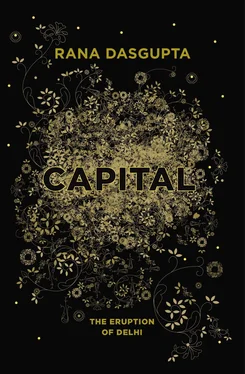Haldar, Rimpa, 282
Hardinge, Lord, 166
health care
corporate hospitals and, 96–114
liberalisation and, 110–14
heirlooms, 48
Hindi, 175, 176, 313–14
Hinduism, 137, 334, 335, 381, 388–89
Hinduja brothers, 369
Hindus, 29–30, 155, 157, 184–85, 188–95, 201–2, 303–4, 334–38, 340
Hindustani, 174, 176
Hindustan Times , 202–3, 314
holocaust, 193–94, 445
hospitals, 96–114
housing for workers, lack of, 273–74
Howard, Ebenezer, 167
“How India Became America” (Kapur), 93
Hugo, Victor, 444
Iltutmish, Sultan, 4–5, 158
impermanence of infrastructure, 23–24
independence movement, 52
Independence speech, of Nehru, 58, 61
India
agriculture, post-liberalisation, 260–62
Americanization of, 93–96
anti-Sikh violence following Gandhi’s assassination, 334–38, 339–42
Bhindranwale-led uprising and Ghandi response, 332–34
British Indian Empire and, 186–87
business process outsourcing (BPO) and, 60–69
centrally planned economy of, 49–50, 53
constitution of, 52
countryside, problems of, 258–71
development indicators, 399
dysfunctional government in, 1960s, 313–14
Five-year Plans in, 53, 54–55
GDP growth in, slowing of, 399
Green Revolution in, 261, 317
IMF loan to, 56–57
under Indira Gandhi, 137–38, 290, 314–18, 328–34
isolationism of, in 1970s and 1980s, 55–56
liberalisation of 1991 and ( See liberalisation of 1991)
male vasectomy program in, 330–31
Maoist insurgency and Salwa Judum response, 260
national emergency declared by Gandhi in, 328–30
under Nehru, 50–55
nuclear test of, 317
Partition of 1947 and ( See Partition of 1947)
population growth in, 313
rural land appropriation in, 259–60
Singh’s economic reforms, 49–50, 57–59
wars fought by, 313, 316
Indian Institute of Management, 54
Indian Institute of Technology, 54
Indian National Congress, 51
Indo-US nuclear deal, 2008, 94–95
industrialisation, European in nineteenth century, 270
information technology (IT) firms, 62
Infosys, 62, 94
International Monetary Fund (IMF), 56, 58, 315
Interview , 89
“In the Early Days of the Delhi Metro” (poem), 40
Islam, 191, 194
Israel, 194
Jagger, Bianca, 42
Jahanara (fictitious name), 240, 241, 244–45, 248–51
Janata Party, 332
Jaswant (fictitious name), 338–43
Jindal, Savitri, 143
Jinnah, Mohammed Ali, 187–88
Kalinin, Mikhail, 52
Kapoor, Rahul (fictitious name), 212–13
Kapoor, Raj, 177
Kapur, Akash, 93
Karachi, 188
Khan, Allauddin, 29–30
Khosla, Vinod, 93
Khusrau, Amir, 158
Kipling, Rudyard, 138
Koda, Madhu, 305, 306
Koh-i-Noor diamond, 151
Koli, Surender, 281–85
Krish (fictitious name), 375–78
Krishna, 199–200, 440–41
Kumar, Amit, 280
Kumar, Dilip, 177
Kumbh Mela, 440
labor force, 268–77
Lady Gaga, 89
Lakshmi (goddess), 380
Lal, Jessica, 204
Land Acquisition Act of 1894, 259, 275
land appropriation, 259–60
land mafias, 259
languages, 173–77
English, 173–74, 314
Hindi, 175, 176, 313–14
Hindustani, 174, 176
Punjabi, 174, 176
Urdu, 153, 156, 159–60, 160, 174, 176–77
legal system, 158–59
liberalisation of 1991, 36–37
farmers, impact on, 261
health care before and after, compared, 110–114
new Indian oligarchy generated by, 344–45
privatization of basic resources after, 345
Singh’s announcement of, 49–50
warrior ethos and, 212
workers’ bargaining power, assault by industrialists on, 266
Liberation Tigers of Talem Eelam, 344
Lutyens, Edwin, 167
Mahabharata , 150, 192, 440
Mahalanobis, Prasanta Chandra, 53
male vasectomy program, 330–31
Malhotra, Jagmohan, 330
malls, 95, 117–18
mangoes, 287–88
Mao Tse-tung, 445
marriage, 118–20
arranged, 118–19
matchmakers and online agencies, 119–20
of Sukhvinder (fictitious name), 116–32
wives and mother-in-laws, conflicts between, 136–38
Maruti Motors, Ltd., 362
Maruti Suzuki, 10
Marx, Karl, 258
matchmakers, 119
Mayawati, 347–49
Meenakshi (fictitious name), 237–57
Meenu (fictitious name), 319–28
metals business, 295–98
middle classes, 77–148, 397–420
Anurag (fictitious name) interview, 407–20
bohemian culture and ideals of young people of, 39–43, 81–84
business process outsourcing (BPO), opportunities provided by, 72–74
centralised authority, relation to, 436
corporate culture, impact of, 77–81
discontent of, 115–16, 398–407
elite control of society and, 399–407
families, stresses on, 115–33
global capitalism, spiritual impacts of, 95–96
health care system and, 96–114
moods of, from 1990s to 2012, 397–407
plight of poor and, 272, 273
pre-globalism community life, 37–40
servants, relation to, 262–65
women’s evolving role, post-liberalisation, 134–48
migration, as movement in time, 48
Mir Taqi Mir, 153, 442
Mishra, Anupam, 422–33, 441–43, 446–48
Mittal, Lakshmi, 143, 369
Mohammad, Prophet, 4–5
money, 221
mother-in-laws, conflicts between wives and, 136–38
Mountbatten, Lord, 50
Mughals, 150–51
Mulgaonkar, S., 314
multiculturalism, 41
Mumbai, 16, 17
Muslims, 29, 155, 157–63, 184–85, 188–95
Nadir Shah, 151
Nanak, Guru, 334
Naoroji, Dadabhai, 51
Narayan, Jayaprakash, 329
national emergency, 328–30
Nehru, Jawaharlal, 50–55, 58, 59, 98, 313, 317
economic programs of, 52–55
educational background of, 50
Independence speech of, 58, 61
visit to USSR of, 51–52
Nehru Place, 362
networking, 327
New Delhi, 150, 165–74
architecture of, 167–68
British decision to build, 165–67
building contractors as new aristocracy of, 168–72
New York, 41, 434–37
New York Times , 58–59, 93
9/11 terrorist attacks, 41
Nithari murders, 277–86
Nizamuddin Auliya, 157–58
Noida, 273, 277
Nuclear Non-Proliferation Treaty, 94
Oberoi, Colonel (fictitious name), 179–85
Okhla, 273
oligarchy. See elites/aristocracy
online marriage agencies, 119–20
organ stealing, 279–81
ownership, of resources, 41
Paco Rabanne, 86
Pakistan, 186–88, 313, 316
Pandher, Moninder Singh, 278–85
Paris, 435
Partition of 1947, 3, 29–30, 186–208, 335, 445
Colonel Oberoi (fictitious name) interviews, 181–82, 184–85
emasculation of men and, 200–206
refugees, 192–95
violence accompanying, 189–91, 194
women, abduction and return of, 200–202
Peacock throne, 151
politics/politicians, 305–6, 345–53
business-politician partnerships, 347–53
personal wealth of, 346–47
privatization and, 345–46
poor and working classes, 236–86
agricultural economics and, 260–62, 271
average annual salary of, 258
bargaining power of, lack of, 266–67
in Bhalswa Colony, 236–52
centralised authority, relation to, 436
as cheap labour source, 262–68
as construction workers, 265–66, 276
as factory workers, 265–66, 271
housing, lack of, 273–74
Nithari murders and, 277–86
Читать дальше











